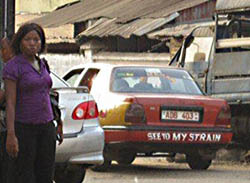 |
Although in local Sierra Leonean Pidgin "see to my strain" does not have anything to do with rhizobia and inoculation, this text on the back of a car in Freetown nicely covered the purpose of our trip to Sierra Leone and Liberia, where N2Africa is currently expanding with additional funding from the H.G. Buffet foundation. During the first exploratory trip from March 18-23 we considered both the rhizobial and other legume-associated issues of see to my strain and what it actually means in Pidgin: see to my problems. |
Sitting at the SLARI office at the top of a hill in Freetown, we got involved in the work undertaken by SLARI (Sierra Leone Agricultural Research Institute), IITA (International Institute of Tropical Agriculture), the universities and various NGOs and discussed how we can complement each other’s work best. These workshops yielded a large amount of information about amongst others current research and development programs, what kind of legumes Sierra Leoneans like to eat and when and how they usually plant them. From two representatives from the private sector we learned that there is a demand for soybean for the rising poultry industry and for soybean and cowpea for the (baby-)food industry. Lack of availability of improved seed and inoculant came up as major problems where N2Africa can assist.
In Liberia the workshops were hosted in the spacious IITA office in Monrovia, where besides the IITA staff involved, various NGOs, the University of Liberia and some representatives of the private sector had gathered. Also here we received a vast amount of information and decided, like we had done earlier in Sierra Leone, to start working on groundnut and cowpea, since these are popular legumes among both Sierra Leoneans and Liberians. As a relatively new crop, soybean is also going to be part of our program.
While everybody participated very enthusiastically and we see many opportunities for making N2Africa a success in Liberia and Sierra Leone, we must first see to the strains (problems). Since in both countries improved seed is not readily available, the first year N2Africa will focus on agronomy trials to screen varieties and responses of the legumes to input use and pest management. For this purpose we will import – one time only! – about 500 kg of improved seed to each country. Besides demonstration trials on intercropping, the NGOs involved will take on community based seed multiplication so that next year we can start dissemination of the legume technologies among farmers well prepared.
We will soon see to the first strains and have improved seed and inoculant shipped to Sierra Leone and Liberia and hope to have the first trials implemented in time!
Greta van den Brand
